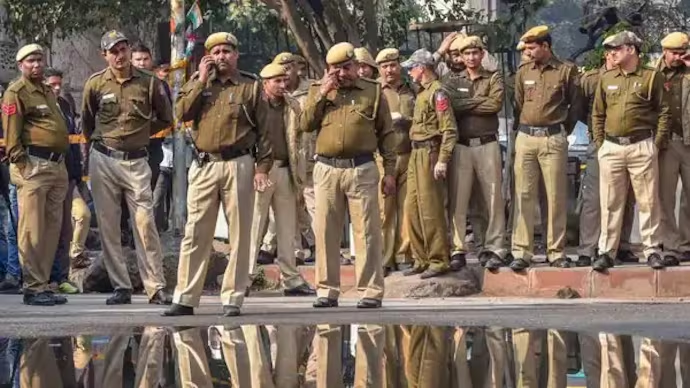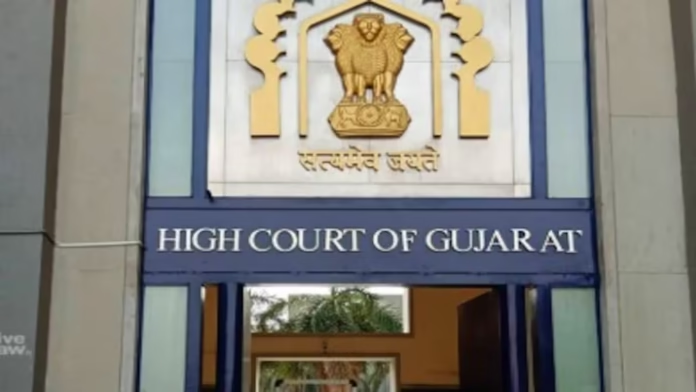The Gujarat High Court was thrown into chaos after a bomb threat email claimed that explosives had been planted inside the court premises. The threat, which arrived just before noon on Tuesday, forced officials to suspend proceedings and launch an immediate security sweep. Hours later, after a thorough search, police confirmed that the bomb threat was a hoax.
Court Proceedings Suspended After Threat
According to court officials, the threatening email warned of bombs set to detonate later in the evening. The Gujarat High Court administration acted quickly, suspending post-lunch proceedings and ensuring lawyers, staff, and visitors were safely evacuated.
Entry and exit points were sealed, and bomb squads, police teams, and canine units were deployed to search every corner of the sprawling court complex. From courtrooms and staff offices to parking lots and stairwells, every section was carefully examined to rule out danger.
Security Sweep Finds No Explosives
The massive search operation lasted several hours, causing significant disruption to judicial work. However, no suspicious devices or explosives were found. Police later declared the Gujarat High Court bomb threat a hoax, but not before a wave of panic had already gripped the legal fraternity and the public.
This is not the first time the High Court has been targeted. Officials confirmed that a similar bomb hoax email was received just weeks earlier, highlighting a disturbing pattern of repeated threats.
Investigations Point to Known Hoax Patterns
Preliminary analysis revealed that the email’s style resembled messages linked to Rene Joshilda, a woman already in police custody for sending multiple bomb hoaxes across India. Authorities believe the name may have been deliberately used to create confusion and fear.
The Cyber Crime Branch is now working to trace the origins of the email. An FIR has been lodged at the Sola police station under the Bharatiya Nyaya Sanhita and IT Act provisions related to false threats, cybercrime, and creating public alarm.
Rising Pattern of Bomb Hoaxes in Gujarat
The Gujarat High Court is not the only institution to be targeted in recent months. Similar hoax threats have disrupted schools in Vadodara and court complexes in Rajkot. Each incident has forced large-scale evacuations, intense police action, and widespread public anxiety.
Officials note that while all these threats turned out to be false, they drain valuable resources and cause unnecessary panic. Repeated hoaxes also risk making institutions complacent, which could be dangerous if a real threat were ever to occur.
The Need for Stronger Cybersecurity in Courts
Experts warn that the Gujarat High Court incident underscores the urgent need for stronger cybersecurity measures in judicial institutions. With court systems increasingly dependent on digital communication, officials must be equipped with tools to detect and filter malicious emails in real time.

Security experts recommend integrating advanced threat-detection systems, regular cybersecurity drills, and stronger collaboration between courts and law enforcement agencies. Public institutions also need protocols to distinguish between genuine and false threats quickly, ensuring minimal disruption.
Judicial System Under Pressure
The Gujarat High Court bomb hoax has raised larger questions about the vulnerability of India’s judicial institutions to digital threats. While the latest email turned out to be fake, the disruption it caused was real. Court schedules were thrown off track, staff and lawyers were inconvenienced, and police resources were heavily diverted.
Senior lawyers have urged the government to take the matter seriously, pointing out that repeated hoaxes not only erode public confidence but also threaten the integrity of the judicial system.
The bomb threat hoax at the Gujarat High Court may have ended without tragedy, but it left behind lessons about preparedness, vigilance, and the urgent need to address cybercrime. While authorities continue to investigate the origins of the threat, one thing is clear: India’s judicial institutions must strengthen their defenses against the growing menace of hoax threats that can paralyze critical systems and spread unnecessary fear.
ALSO READ:Bengaluru Stampede Before RCB Victory Celebration: Ignored Police Warning Sparks Political Firestorm












